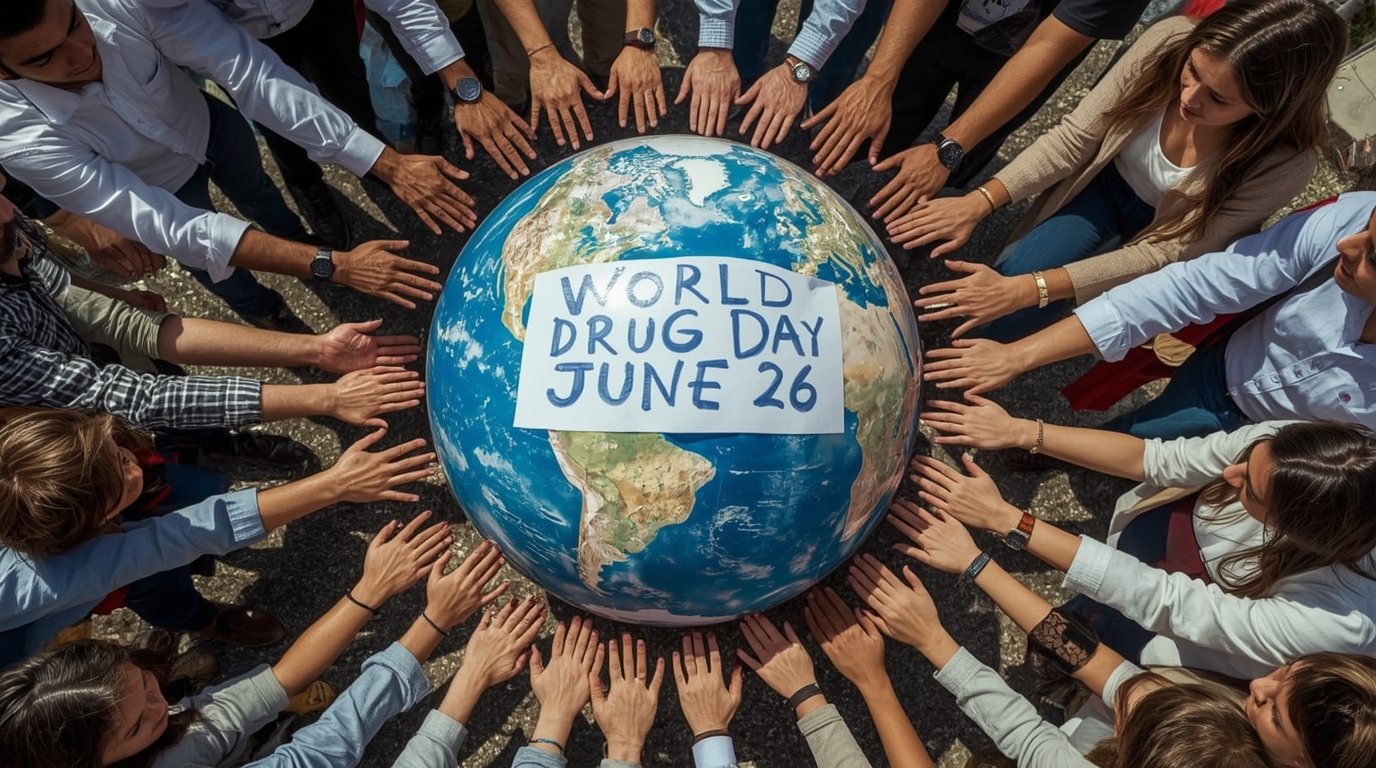World Drug Day June 26
Every year on June 26, the world observes World Drug Day, officially known as the International Day Against Drug Abuse and Illicit Trafficking. Established by the United Nations General Assembly in 1987, this day serves as a powerful reminder of the urgent need to combat drug abuse and illegal drug trafficking on a global scale.
The observance of World Drug Day highlights the devastating impact of substance abuse on individuals, families, and communities while promoting international cooperation, prevention strategies, and evidence-based treatment programs. Led by the United Nations Office on Drugs and Crime (UNODC), this day encourages governments, organizations, and individuals to take collective action toward a drug-free society.
Why World Drug Day Matters
- Raises Awareness: Educates the public about the dangers of drug abuse and its links to crime, health crises, and socioeconomic challenges.
- Promotes Prevention: Advocates for early intervention, youth education, and community-based initiatives to reduce drug demand.
- Strengthens Global Cooperation: Encourages nations to collaborate in disrupting illicit drug trafficking networks.
- Supports Recovery: Highlights the importance of accessible treatment and rehabilitation for those struggling with addiction.
With the theme changing annually, World Drug Day 2024 will focus on evidence-based approaches to drug policy, emphasizing health, human rights, and sustainable development.
Join the global movement on June 26 to take a stand against drug abuse and support policies that foster healthier, safer communities worldwide. Together, we can work toward a future free from the harms of illicit drugs
🌐 The Theme for 2025
Every year on June 26, the world unites to observe World Drug Day, officially known as the International Day Against Drug Abuse and Illicit Trafficking. Established by the United Nations General Assembly in 1987, this day serves as a global platform to raise awareness, strengthen prevention efforts, and promote evidence-based solutions to combat drug abuse and illegal trafficking.
In 2025, the theme “People First: Stop Stigma and Discrimination, Strengthen Prevention” calls for a humane and health-centered approach to drug policy. This powerful message emphasizes:
- Compassion Over Punishment: Treating drug users with dignity and understanding, rather than criminalizing addiction.
- Ending Stigma: Challenging societal prejudices that prevent individuals from seeking help.
- Prioritizing Prevention: Expanding education, early intervention, and community-based support to reduce drug abuse.
Led by the United Nations Office on Drugs and Crime (UNODC), World Drug Day 2025 highlights the need for inclusive policies that address substance use disorders as a public health issue, not a crime. By shifting focus toward rehabilitation, harm reduction, and social integration, we can build safer, healthier communities worldwide.
Why This Year’s Theme Matters
- Reduces Barriers to Treatment: Stigma often discourages people from accessing life-saving care.
- Promotes Human Rights: Advocates for policies rooted in empathy, science, and social justice.
- Strengthens Communities: Prevention programs protect youth and vulnerable populations from drug-related harms.
Join the global movement on June 26, 2025, to support #PeopleFirst policies and help create a society where everyone regardless of their struggles receives the help they deserve.
📚 The History Behind World Drug Day
The International Day Against Drug Abuse and Illicit Trafficking (World Drug Day) was established by the United Nations General Assembly on December 7, 1987, as a response to the escalating crisis of drug abuse and the illicit drug trade. This observance serves as a global call to action, uniting nations in the fight against narcotics and their devastating societal impact.
Why June 26? Honoring a Historic Stand Against Drugs
The date June 26 was chosen to commemorate a defining moment in drug control history, Lin Zexu’s anti-opium campaign in 1839.
- Lin Zexu, a Chinese official during the Qing Dynasty, led a fierce crackdown on the British opium trade, which was crippling China’s society and economy.
- In 1839, he seized and destroyed over 1.2 million kilograms of opium in Humen, Guangdong, in a bold act of defiance against drug trafficking.
- This event, known as the “Destruction of Opium at Humen,” triggered the First Opium War (1839–1842) but also became a symbol of resistance against drug exploitation.
By marking World Drug Day on this date, the United Nations honors both historical and modern efforts to combat drug abuse, reinforcing the message that global cooperation is essential in creating a drug-free future.
From History to Modern-Day Advocacy
Since its inception, World Drug Day has evolved into a platform for:
✔ Raising awareness on the dangers of substance abuse
✔ Promoting evidence-based prevention and treatment
✔ Strengthening international efforts against drug trafficking
As we observe World Drug Day 2025 under the theme “People First: Stop Stigma and Discrimination, Strengthen Prevention,” we continue this legacy, prioritizing health, dignity, and justice over punishment and marginalization.
Misconceptions about drug addiction fuel stigma and prevent people from seeking help. Let’s separate myths from facts to promote a more compassionate and informed approach to substance use disorders.

🚫 Common Myths About Drug Abuse
Myth 1: “Drug Addicts Are Criminals”
❌ The Myth: People struggling with addiction are often seen as dangerous or morally corrupt.
✅ The Truth: Addiction is a chronic medical condition, recognized by the World Health Organization (WHO) and the American Medical Association (AMA). It alters brain chemistry, impairing self-control and decision-making. Punishment only deepens the crisis, treatment and support offer real solutions.
Myth 2: “Only Certain Types of People Become Addicts”
❌ The Myth: Addiction only affects the poor, uneducated, or “weak-willed.”
✅ The Truth: Addiction does not discriminate, it can impact anyone, regardless of age, income, or background. Genetics, trauma, mental health, and social environment all play roles. Even high-achieving professionals and celebrities battle addiction.
Myth 3: “Treatment Doesn’t Work”
❌ The Myth: People who go to rehab will just relapse, so recovery is hopeless.
✅ The Truth: Recovery IS possible with evidence-based care. Relapse may happen, but it’s part of the healing process, not failure. Medication-assisted treatment (MAT), therapy, and peer support save lives and help people rebuild.
Why Challenging These Myths Matters
- Reduces stigma, encouraging more people to seek help.
- Promotes policies focused on healthcare, not punishment.
- Saves lives by replacing judgment with science-backed solutions.
This World Drug Day 2025, let’s #StopTheStigma and spread facts not myths about addiction.
💔 The Human Side of Addiction: Why Compassion Saves Lives
Behind every addiction, there’s a human story, one often shaped by pain, trauma, and unmet needs. People struggling with substance use disorders don’t just battle chemical dependency; they face a web of systemic and emotional challenges, including:
1. Mental Health Struggles
- Many people with addiction also suffer from depression, anxiety, PTSD, or bipolar disorder—a condition known as dual diagnosis.
- Without proper mental healthcare, self-medication with drugs becomes a survival mechanism.
2. Trauma & Socioeconomic Hardship
- Childhood trauma, violence, poverty, and lack of healthcare access increase addiction risk.
- Marginalized communities often face higher exposure to drugs with fewer support systems.
3. Social Isolation & Collateral Damage
- Stigma leads to job loss, homelessness, and severed family ties, making recovery even harder.
- Criminalization worsens cycles of poverty instead of addressing root causes.
Why the 2025 Theme Matters: “People First”
This year’s World Drug Day campaign “People First: Stop Stigma and Discrimination, Strengthen Prevention” calls for:
🔹 Treating addiction as a health issue, not a crime
🔹 Providing trauma-informed care
🔹 Building inclusive communities that support recovery
Recovery is possible, but only when we replace judgment with empathy and punishment with prevention
🌍 Your Action Guide for World Drug Day 2025
This June 26, you can be part of the global movement for change. Here’s how to make an impact:
1️⃣ Educate to Eradicate Stigma
• Learn the facts about addiction as a health condition (not a moral failing)
• Share reliable resources from WHO, UNODC, or local health authorities
• Host discussions in your community about harm reduction strategies
2️⃣ Support Grassroots Change
• Volunteer at recovery centers or hotlines
• Donate to organizations providing:
- Free counseling
- Needle exchange programs
- Job training for people in recovery
• Organize drives for rehab centers (hygiene kits, books, clothing)
3️⃣ Become a Policy Advocate
• Petition for:
- Decriminalization of personal use
- Increased funding for treatment vs. incarceration
- School-based prevention programs
• Attend town halls and ask candidates their stance on drug policy reform
4️⃣ Amplify on Social Media
Post with purpose:
• Share recovery stories (with consent)
• Create explainer videos on harm reduction
• Use trending formats (TikTok/Reels challenges, Twitter threads)
🔥 Hashtag Toolkit:
#PeopleFirst2025 #HealthNotHandcuffs
#RecoveryIsPossible #EndTheWarOnDrugs
#WorldDrugDay #AddictionAwareness
💡 Pro Tip: Tag @UNODC and local NGOs to increase visibility!
Every action counts, whether you reach one person or one million. How will YOU observe #WorldDrugDay?
National Day
🧴 Related Products to Support Awareness & Wellness
Here are some useful and supportive items:
- Motivational Recovery Bracelets – Wearable reminders for those in recovery.
- Wellness Journal for Mental Health Tracking – Helps track emotions and triggers.
- Aromatherapy Essential Oils Set – Calming aid during withdrawal or stress.
- Stress Relief Coloring Books – Therapeutic, especially for teens and adults in recovery.
- Educational Posters on Substance Abuse – Ideal for classrooms and awareness campaigns.
❓ Frequently Asked Questions
❓ What is the goal of World Drug Day?
To promote global cooperation in combating drug abuse and trafficking, raise awareness, and advocate for a balanced and human-rights-centered approach to drug issues.
❓ How is World Drug Day celebrated?
Through awareness campaigns, public events, webinars, educational programs, and policy discussions across the world.
❓ Can drug addiction be treated?
Yes. With medical help, psychological support, and social reintegration, recovery is possible.
❓ What is the UNODC?
The United Nations Office on Drugs and Crime is the UN agency responsible for drug control, crime prevention, and criminal justice reform.
🌎 A Compassionate Close: Our Shared Responsibility
World Drug Day 2025 isn’t just a date, it’s a turning point. As we observe this day, we’re called to:
✨ See the person, not the addiction
✨ Choose science over stigma
✨ Build bridges instead of barriers
This is how change happens:
- One educated conversation that challenges stereotypes
- One supportive gesture that helps someone seek treatment
- One policy change that prioritizes healthcare over handcuffs
Addiction thrives in isolation, but recovery grows in community. Whether you share a post, volunteer an hour, or advocate for reform, your action matters.
Together, we can rewrite the narrative:
From punishment → to prevention
From shame → to support
From despair → to hope
The road to recovery begins with us. Will you walk it?






Leave a Reply